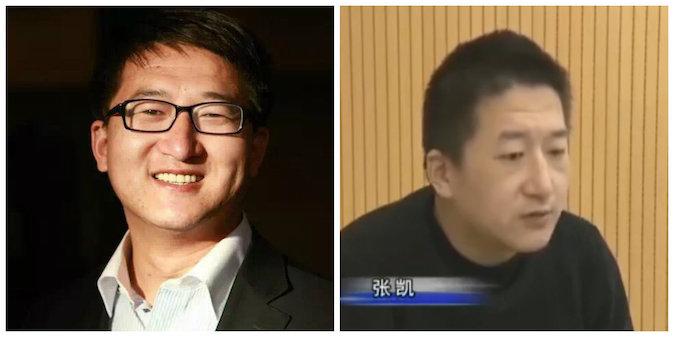UPDATE: In a note dated Feb. 28, sent to an Epoch Times reporter by a friend of the family, Zhang Kai’s parents said that he had been transferred to criminal detention on Aug. 26, and his current whereabouts are still unknown. Zhang Kai’s parents write: “As parents, we are feeling extremely anxious, but we believe that Zhang Kai is innocent, and hope that the Chinese government respects the law. We hope that the Wenzhou police can abide by the law in handling affairs, and that Zhang Kai can be reunited with his family as early as possible. Thank you to all friends who are concerned for Zhang Kai.”
***
Clad in a black collarless shirt, his familiar glasses noticeably missing, Chinese human rights lawyer Zhang Kai spoke in a microphone: “I’ve broken the law, disturbed social order, endangered state security, and violated the ethics of the legal profession.”
“I am deeply remorseful for my actions,” he added in a neutral tone, expression hollow.
Zhang Kai’s confession was part of an 11-minute-long news clip published on Feb. 25 by a semi-official media outlet in Wenzhou, a city in eastern China. Exactly six months ago, Zhang and his assistant Liu Peng suddenly vanished in Wenzhou while they were providing legal aid to churches whose crosses were forcibly removed by the local authorities. Days later, Zhang’s family was notified by public security officials that he was being placed “under surveillance” for disturbing social order and trading “state secrets.”
The reappearance of Zhang marks the first time friends and family have seen him in half a year. His supposed confession is also the latest in a series of forced admissions of guilt by Chinese citizens and foreigners broadcast in recent months after a wave of arrests by the Chinese communist regime. That crackdown has in particular targeted hundreds of Chinese human rights lawyers and activists, an affair that is being referred to as the “709 Incident.”
In the video clip, some Wenzhou Christians, a public security officer handling Zhang’s case, and even Zhang’s vanished assistant Liu Peng were all lined up to condemn the lawyer for conduct supposedly most unbecoming of an attorney and a Christian. Zhang was said to have “hoodwinked” Wenzhou Christians into paying him exorbitant legal fees to handle their cases, only to find themselves mobilized to partake in protests against the local government that advanced Zhang’s “political ambition.” Zhang was supposed to be carrying out his machinations on the orders of unnamed foreign forces who funded his campaign, the news report said.

Zhang Kai has been defending Christians in China for years. He has been particularly active in the city of Wenzhou in Zhejiang Province, where the local authorities have been forcibly demolishing church crosses, and sometimes churches, and in recent years, on the excuse that they are illegal structures. Several church pastors in the city have been arrested and detained for protesting.
It is unclear if Zhang Kai has been formally charged by Chinese prosecutors. Still, the airing of the forced confession—a Chinese Communist Party legacy that is reminiscent of the Cultural Revolution for many—and gathering of people to support the charges leveled against Zhang, is enough to smear and discredit his work, according to a friend of his.
“It’s practically criminal to publicly humiliate people by forcing them to make televised confessions on state-controlled media before a proper trial,” said the friend, who lives in China and has worked with Zhang before. The friend spoke to Epoch Times on condition of anonymity.
“I felt deeply pained after seeing Zhang Kai on television,” the friend said. “For someone so filled with infectious energy and vitality to appear so haggard on television. He must have made his confessions only after prolonged torture sessions.”
On Feb. 26, State Department spokesman Mark Toner said Zhang Kai’s forced confession was “counter to the standards of a rule of law.”
“We urge China to release Zhang and other detained for seeking to peacefully uphold the freedom of religion guaranteed in China’s constitution,” Toner said.
Frank Fang contributed to this article.




